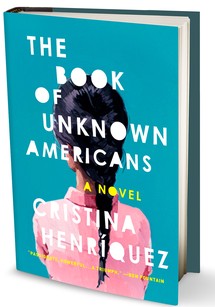The Book of Unknown Americans
By Cristina Henríquez
304 pages;
Knopf
A novelist of Panamanian descent imagines the sweet—and bitter—reality of coming to America.
In her passionate third work of fiction, The Book of Unknown Americans, Cristina Henríquez gives voice to the unheard stories of people who have quit their native countries for what they hope will be a better life. Alternating points of view bring to life nine families living in a dingy apartment building in Newark, Delaware, who have fled their birthplaces—dusty towns in Panama, Mexico, Nicaragua, Guatemala, Paraguay—to begin anew in the States.
They have come for different reasons: Rafael Toro abandons Manuel Noriega's Panama to work his way up from busboy to line cook; in the evenings he and his wife study the Constitution to prepare for their citizenship test. The Riveras arrive at dusk, unfolding themselves from the back of a red pickup truck after a days-long journey from Pátzcuaro, Mexico. They are here legally, desperately hoping that an American school will restore their 15-year-old daughter, Maribel, who has suffered a traumatic brain injury, to the outgoing girl she used to be.
But the land of opportunity doesn't deliver on all its promises. Arturo Rivera, who owned a construction company in Mexico, now works as a laborer, picking mushrooms from dank soil in a windowless warehouse. His wife, Alma, assured that this country is safer than the one she left, nevertheless feels panicked in her unfamiliar surroundings.
The Toros offer their new neighbors friendship, sharing steaming plates of chicharrones and teaching them to dress in layers when the temperature falls. Their son, Mayor, is smitten with Maribel from the moment they meet; as the novel unfolds, the two—undeterred by Maribel's limited communication—share meaningful conversations, a tentative first kiss and a tender love.
Through her characters' fears, their robust affection for one another and their resilience, Henríquez illuminates the disparity between the lives they've given up and the few benefits they've gained. For some, the struggle to find new identities as Americans yields rewards; for others, the transition is too difficult, and they return home the way they came: "out of one world and into the next."
— Abbe Wright


